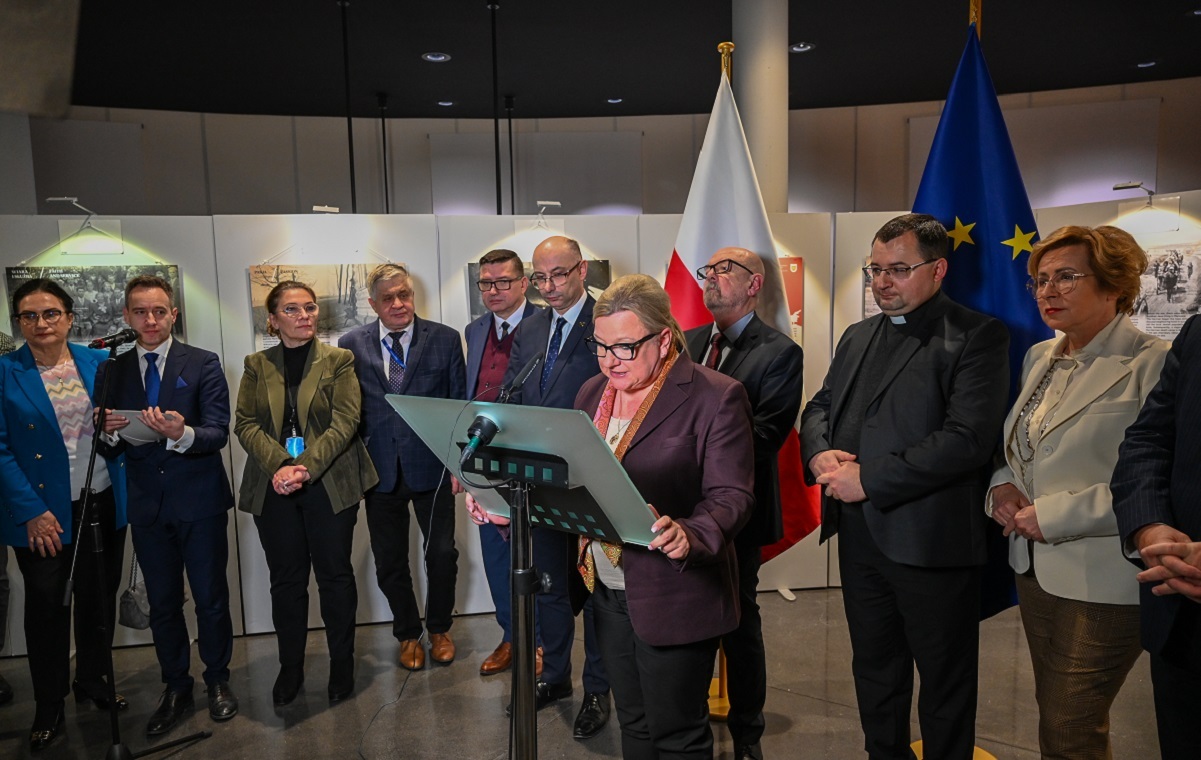Today in Strasbourg, at the plenary session of the European Parliament, the opening of the exhibition organized by ECR MEP Beata Kempa entitled “Ulmas – Polish Samaritans” was dedicated to the tragic history of the family of Polish heroes, Wiktoria and Józef Ulma, who were killed together with their children for protecting eight Jews during World War II. The event was opened by the co-chair of the EKR group, Prof. Ryszard Legutko, and attended by the Vice President of the Institute of National Remembrance, Dr. Mateusz Szpytma, Director of the IPN Branch in Rzeszów, Dr. hab. Dariusz Iwaneczko, as well as the postulator of the Ulma Family process, Fr. Dr Witold Burda.
Prof. Legutko, opening an exhibition about a family that lost their lives while harboring Jews during World War II, recalled that “helping Jews in Poland during World War II was something different than helping Jews elsewhere.”
What we are dealing with here is a record of human heroism, supreme sacrifice, extreme humanity
– emphasized the MEP, noting that the experience of World War II is unimaginable from today's point of view.
“Today this symbol of humanity is in Strasbourg, in the European Parliament.
Beata Kempa emphasized that this was a major event, not only on a European scale but also globally. He recalled that the beatification of the Ulma family took place in September and this was the first case in the history of the Church when an entire family was beatified.
Referring to the exhibition title “Ulmas – Polish Samaritans”, MEP highlights the humanity that this family shows every day.
They protected the Jews, protected those who were fleeing from their tormentors – the Germans, those who had nowhere to go, who could die in extermination camps, could be shot at any time.
– he says.
In this context, he recalled the bizarre accusations of the Holocaust often leveled against Poland “by evil forces.”
Today this symbol of humanity is in Strasbourg, in the European Parliament. We prove here that the Poles helped the Jews, that the Poles helped, risking not only their lives and health, but also their entire families, to protect those who fled from death. A beautiful symbol, a great exhibition, a great day at the European Parliament
– stressed the event organizers.
“They are not passive in facing the cruel course of history.”
Ph.D. Dariusz Iwaneczko, director of the Rzeszów branch of the Institute of National Remembrance, notes that by looking at Józef Ulma's photographs, we follow the fate of a seemingly ordinary, although at the same time very unique, Polish family.
We see a family whose lifeline was brutally severed at the end of the war. Józef and Wiktora Ulma were not passive in facing the cruel course of history. They become active participants, looking out for others who need help. They stand on the side of goodness and share goodness with others. National, religious and cultural differences became irrelevant in the face of the terror of the German occupation. What is important is humanity based on deep-rooted Christian values and the centuries-old culture of European civilization. The Ulmas, who wanted to protect the lives of their Jewish brothers, lost their lives instead
– said the director of the Rzeszów branch of the Institute of National Remembrance.
He added that such an attitude cannot be ignored and hopes that this exhibition can help get to know the Ulma family and their heroic attitude of love.
Beatification process
The beatification process for the family of Ulma, who was murdered on 24 March 1944 by the Germans for harboring Jews, began in 2003.
On December 17, 2022, Pope Francis approved the decree on the martyrdom of the Ulma family and authorized the Dicastery for the Causes of Saints to publish it.
On September 10, 2023, Pope Francis included the Józef and Wiktoria Ulma family and their seven children among the blessed.
aja/grupaekr.pl

“Reader. Future teen idol. Falls down a lot. Amateur communicator. Incurable student.”


![Bogusław Wołoszański: “Achieving nuclear weapons would be the beginning of World War III” [WYWIAD]](https://storage.googleapis.com/bieszczady/rzeszow24/articles/image/877236c0-66fd-457a-9eb4-41792f9077ff)




